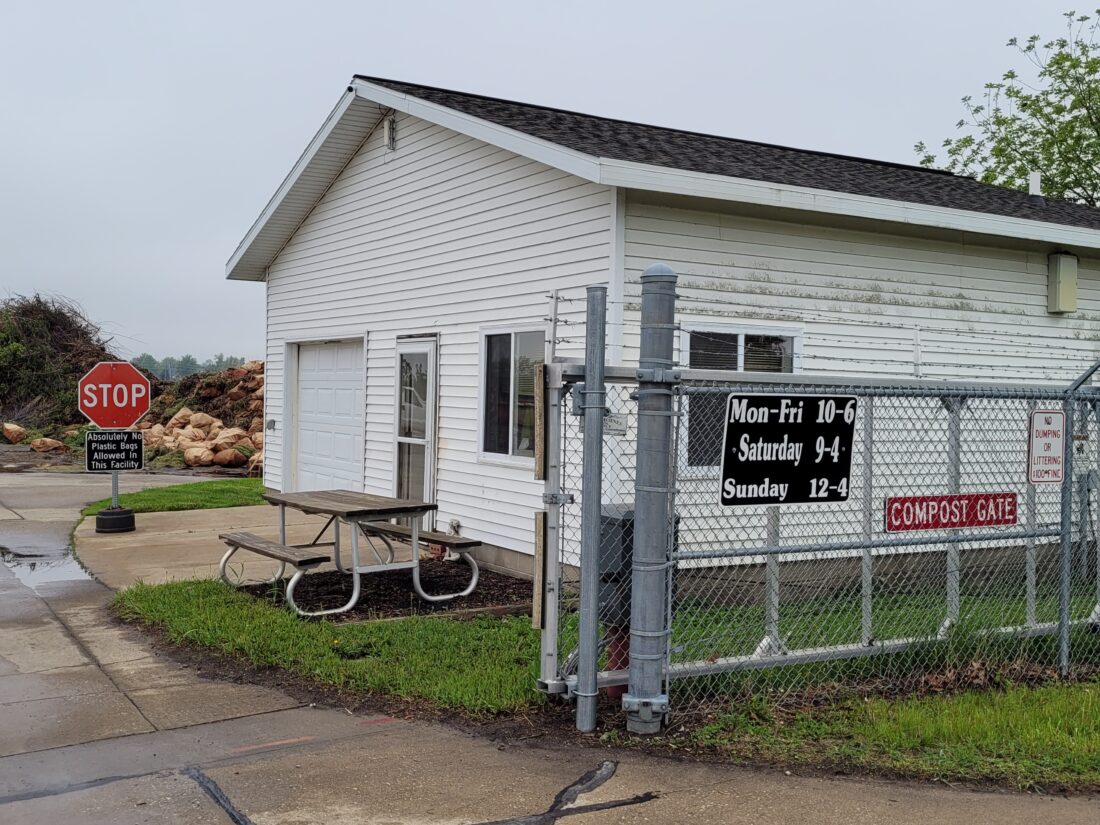Is the compost fee legal?

T-R File Photo
(Editor’s note: This is the second installment in a two-part series about the controversy surrounding the proposed Marshalltown compost fee and legal questions about if or how it can be imposed.)
Since the idea of installing a citywide compost fee was first discussed by the Marshalltown city council in March, it has been one of the most heavily discussed items on the agenda.
The council appeared ready to move ahead with the fee going into its meeting on June 13. Then it changed direction and tabled the item until its July 11 meeting.
A frequent question raised while the fee has been mulled is whether or not it is legal. During the March 28 public comment period on the discussion item, Mark Eaton cited an Iowa Supreme Court ruling from 2006, Kragnes v. the City of Des Moines.
In the case, Lisa Kragnes, a Des Moines resident, brought a suit against the city alleging its franchise agreements on gas and electric power services were illegal taxes. The District Court system agreed with her.
Though initially the Supreme Court did not agree that the district should have ruled the entire franchise fee an illegal tax, it would later confirm the ruling. After multiple rounds of appeals, the Supreme Court eventually came to the decision that the City of Des Moines charged excessive franchise fees, which amounted to an illegal tax.
“If it is calculated not just to recover a cost imposed on the municipality or its residents but to generate revenues that the municipality can use to offset unrelated costs or confer unrelated benefits, it is a tax,” the court ruled.
The court also noted a city is not required to calculate its administrative expenses “to a mathematical certainty,” implying that expenses may be estimated within a reasonable amount of its actual administrative costs.
Fee or tax?
 Eaton, who has appeared on the ballot twice in the last year for city council and county treasurer positions, argued an urban tree fee or compost fee would be a tax because it does not provide a special benefit to those who pay it, an interpretation that falls in line with the court’s definition of the difference between a fee and a tax.
Eaton, who has appeared on the ballot twice in the last year for city council and county treasurer positions, argued an urban tree fee or compost fee would be a tax because it does not provide a special benefit to those who pay it, an interpretation that falls in line with the court’s definition of the difference between a fee and a tax.
Brent Hinders, an attorney with the Des Moines-based firm Hopkins & Huebner, said the Kragnes case is worth considering when a city is imposing a fee on its residents. Hinders’ areas of practice include municipal and employment law.
“The question of if it’s a tax or not is the ultimate question,” Hinders said. “That city needs to be mindful and careful and concerned about if what they see as a fee is in fact a tax.”
Hinders further explained how the fees collected are used is also a consideration when deciding if it is a fee or a tax. The term “reasonable” or “reasonably related,” which also appears in the Kragnes case, may sound broad or vague, but Hinders notes the case laid out several examples of what are considered reasonably related expenses. Inspection, supervision and regulation of a utility, along with administrative expenses, are considered reasonably related.
“It would have to be something necessary and appropriate that relates to the service being provided,” he said.
“It’s always appropriate for community members to ask these sorts of questions,” he continued. “And it’s important for cities to be up front, as far as they can be. Generally speaking, utilities are reasonably related to the city’s operating government.”
‘It’s going to get voted down’
When the city council initially discussed the compost fee and the urban tree removal fee, the starting rate of the fees was one dollar per month to Marshalltown Water Works customers. With an estimated 10,150 total accounts, including commercial accounts, the rate would generate $121,800 annually.
After some discussion, the council moved the conversation toward a $1.50 fee per month for all Water Works customers, which would generate $182,700 in revenue.

Kinser
The urban tree fee later fell by the wayside. During a regular council meeting on April 25, City Administrator Jessica Kinser said attorneys at Lynch-Dallas found an issue with the proposed fee.
“The word that was problematic with them was ‘utility’ and what you can establish as a utility,” she said at the meeting. “With a few different go-arounds, there doesn’t seem to be any way to get around the word ‘utility’ and tie it back to Iowa code.”

Thompson
Councilman Gary Thompson has spoken out and voted against the compost fee, as it is being proposed, repeatedly. He clarified he is not against the fee itself, but the $1.50 per month rate.
“My philosophy is all we had to do was replace the cost of the gate fee, which is only $21,000, which is what we generate in revenue annually,” Thompson said. “That comes to about 17 cents per month on the water bill.”
A rate of 17 cents per month would cost a Water Works customer $2.04 per year. The city’s budget comparison report of enterprise funds, included in an agenda packet during the budgeting process, shows $38,912.01 in revenue from gate fees/tree disposal for 2020-21, due to increased activity involving derecho cleanup.
The total revenue for the year was $54,595.28 which included the sale of compost, mulch, firewood and compost bags, and the total expense for the compost facility in the 2020-21 was $30,552.31.
In the spring, there was discussion of putting the urban tree fee on the ballot during one of the two election dates this year. Since compost is an existing utility, a fee does not require an election, according to Kinser. The decision on whether it moves forward is in the hands of the council on July 11, but Thompson doubts the fee still has legs.
“When it comes back on July 11, it’s going to get voted down and stay exactly the way it is,” he said. “I would still like to see the compost facility be free. I still think we can do it.”





